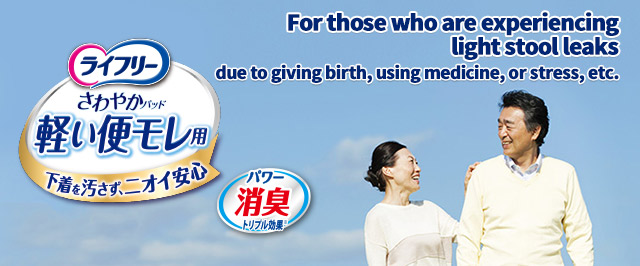FAQ
It’s an illness where stools leak without a person noticing or against a person’s own will. It’s a state when a person can’t control bowel movements well due to a physical disorder or problem.
There are 2 types. With passive fecal incontinence, stools leak and the person doesn’t notice. With urge fecal incontinence, a person feels the urge to go to the bathroom but can’t hold it, and stools leak.
There are multiple anal sphincter muscles that move to tighten the anus so that stools won’t go out except during a bowel movement. The internal anal sphincter tightens the anus even if a person doesn’t notice. Passive fecal incontinence occurs when it becomes difficult for this sphincter to close.
There are many people who end up staying at home because they feel uneasy about going out, because stools end up leaking without them noticing, and they don’t know when stools will leak.
*There are also cases when a person has both passive fecal incontinence and urge fecal incontinence.
Out of the anal sphincter muscles, the external anal sphincter tightens when the person is aware of it. Urge fecal incontinence occurs when the external anal sphincter doesn’t tighten sufficiently. When a person feels the urge to go to the bathroom, the anus doesn’t tighten sufficiently, so stools end up leaking between the time when they thought “I want to go to the bathroom” and the time they use the bathroom.
*There are also cases when a person has both passive fecal incontinence and urge fecal incontinence.
The following types of things may cause fecal incontinence.
- A person is bedridden and has strong constipation (fecal impaction) caused by being unable to hold the position necessary to have a bowel movement
- Leaks of diarrhea (side effects of medicine, overuse of laxatives, etc.) or loose stools
- Neurological impairments due to strokes, spinal nerve injuries, or diabetes, etc.
- Anatomical impairments due to external injuries or surgery, etc.
- Functional impairments due to motor function impairments or dementia, etc.
It is difficult to point to a single cause for fecal incontinence, and it is believed that a combination of several factors are involved in the manifestation and progression of symptoms. In addition, fecal incontinence can also occur in the absence of any clear causes.
The points for improving fecal incontinence are getting stools to be an appropriate hardness and keeping stools from accumulating in the rectum. It’s also good to make a habit of doing pelvic floor exercises to train the external anal sphincter, because its muscle strength decreases as a person ages.
The softer the stools are, the higher the level and frequency of fecal incontinence will be, so it's important to be careful about what you eat and to keep stools at an appropriate hardness.
The key points for this are to actively consume dietary fiber that has the function of making stools harder, and avoiding food and drinks that make stools softer.
[Foods and drinks that make stools softer]
Alcoholic beverages, caffeine, citrus fruits, spices, etc.
If there are no stools in the rectum, fecal incontinence can’t occur. Normally, when stools have accumulated in the rectum, a person feels the urge to go to the bathroom. But people with fecal incontinence should make a habit of having frequent bowel movements even if they don’t feel the urge to go to the bathroom.
If you use your gastrocolic reflex (the urge you easily get to go to the bathroom after food has gone into your stomach), and continue to take action (put pressure on the abdominal muscles) to always have a bowel movement after eating, you will gradually become able to have bowel movements systematically.
If you become able to systematically have bowel movements before going out and before sleeping, etc., you will probably be able to significantly reduce your concerns about fecal incontinence.
The external anal sphincter is related to fecal incontinence, and you can train it by training yourself to contract your pelvic floor muscles.
The pelvic floor exercises that train the pelvic floor muscles not only help with fecal incontinence, but can also prevent urinary incontinence, so it’s good to make a habit of doing them.















